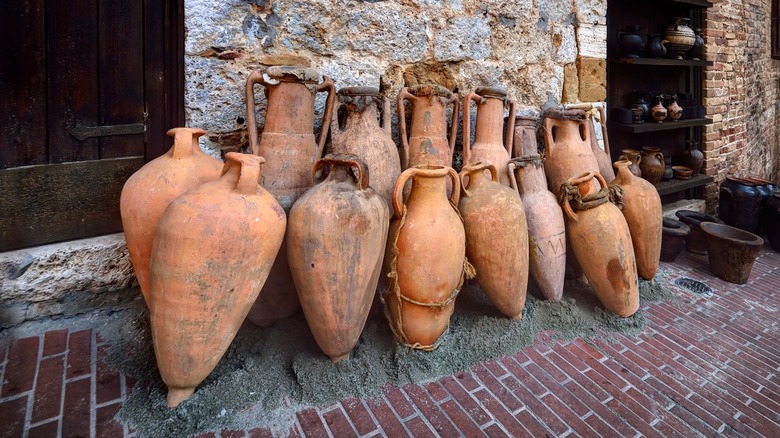The World's First-Ever Beer Recipe Has Been Around Since Ancient Times
Foodies have been enjoying beer since they first invented the language to talk about it. Ancient Egyptian brewers, who were known for their herbal wine, were making fortified beer around 2,575 B.C., but some historians speculate that beer might have been developed in different parts of the world by different peoples simultaneously. Still, while much of this dating is based on the educated compilation of known facts, concrete (or rather, clay) evidence was discovered from the Sumerians of ancient Mesopotamia. The oldest recorded recipe for beer-making is immortalized in a poem-slash-drinking song preserved in cuneiform on clay tablets from 1,800 B.C. called "Hymn to Ninkasi."
Ninkasi was the ancient Sumerian goddess of brewing, fertility, and the harvest. Researchers have identified chemical traces of ancient beer on the insides of clay jar fragments dating back to 3,500 B.C., long before the poem about her was recorded in clay. Historians have embarked on some major teamwork since the tablets were discovered. Miguel Civil, Professor of Sumerology at the University of Chicago, translated the poem, and the recipe was recreated by Fritz Maytag, founder of San Francisco's Anchor Brewing Company, which closed in 2023.
Archaeologists have recreated the ancient beer recipe from millennia-old archaeological findings and found the brew to be a dry, non-bitter, hard-cider-adjacent flavor with a 3.5% ABV — not dissimilar from contemporary beers. The ancient Mesopotamians would have drunk their beer from large jugs with drinking straws, and since hops had yet to be discovered, Sumerian beer was brewed to be enjoyed immediately after it was finished.
Ancient Sumerian cerevisaphiles knew what was up
Ancient beer-making relied on natural fermentation, and it's unclear whether those scientific processes were initially intentionally manipulated by the ancients or discovered by happy accident. As the cuneiform poem-slash-recipe "Hymn to Ninkasi" explains (via The Oriental Institute of The University of Chicago), ancient Mesopotamian beer-making started in a pit, where the "bappir" (Sumerian malted barley dough) was mixed with honey and aromatics, then baked in an oven (aka the production of malted grain).
Next, the malt was transferred to a jar and soaked with the bappir to ferment. Then, the cooked grain mash was spread on large reed mats to cool, and the wort (grain solution) was brewed with more honey and wine. Finally, the mixture was filtered through a vat and passed into a collecting vessel, and from this vessel, the beer was served. The cultural significance of beer in ancient Mesopotamia cannot be overstated.
Some historians regard the 18th century B.C. as the peak of ancient Sumerian civilization, and during that time, the Sumerians held great reverence and awe for the fermented beverage. Beer was involved in ancient Mesopotamian social rituals and religious events (and so was butter, which was sacred to ancient Sumerians.) Even Enki, the Mesopotamian god of wisdom (and father of Ninkasi), was known to get drunk occasionally. Mesopotamians invented beer 300 years before inventing money, and according to cuneiform records, workers might have even been paid in beer, with different quantities determining the hierarchy of the workers.

